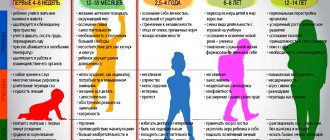Every person goes through age-related crises in his life. Since children develop quickly, their crises are more vivid and noticeable. The crisis of three years in a child is considered one of the most intense during the period of growth. Until recently, the baby was calm and affectionate, listened to adults and followed the established rules. And now he begins to protest against the previous way of life, try to separate from his parents, and defend his rights to independent existence. He is mischievous, screams, cries if something doesn’t work out or something is denied.
The main advice for parents is to remain balanced when communicating with the baby, and then after the end of this difficult period the baby will also become calmer, independent and reasonable.
What is the three-year-old crisis?
The three-year crisis in children is a period of life in which they acquire a huge number of new personal formations. The baby psychologically separates from his mother, strives for independence, and reaches a new level of communication with adults and peers. He wants to be “like big,” but he can’t do much yet due to his age. As a result of this dissonance, the child develops hysterics, resentment, and “deteriorates” in behavior. In short, the crisis of three years is a period of rapid development.
Causes of child crisis 3 years
According to the theory of L.S. Vygotsky, a child’s growing up is an alternation of stable and crisis periods of mental development. In stable periods, the child develops slowly and linearly, in periods of crisis - rapidly and spasmodically. One of the main causes of the crisis is the child’s conflict with the outside world. He wants to do everything on his own, but he is prevented from doing this by circumstances that he cannot influence, for example, adult prohibitions and an insufficient level of knowledge and skills.
Factors influencing the intensity of crisis manifestations:
- Type of nervous activity. Children with a weak or unstable type - melancholic and choleric - are more likely than others to throw tantrums, be capricious and protest against the rules during a crisis. Phlegmatic and sanguine people have an easier attitude towards obstacles in their lives and usually behave a little more calmly.
- Authoritarian parenting style in the family. If parents constantly suppress the child’s impulses for independence, then he resists this more than if this does not happen.
- Anxious type of parenting and overprotection. In such a family, the child’s independence is also suppressed, only for other reasons: the parents consider him a very small child who cannot do anything on his own. Protests and hysterics in this case are inevitable.
- Tensions in the family. If conflicts often occur between parents, then the child unconsciously tries to attract attention to himself. He practically fails to do this, so the crisis of three years manifests itself more intensely.
- Health status. Children with mental and neurological developmental disabilities experience an age-related crisis much more acutely than their healthy peers.
Causes
The main reason why children experience a crisis at age 3 is the desire for independence. By this age, they already speak well and can clearly and clearly express their desires and emotions verbally. It seems to them that this is enough to be the same as adults: eat what they eat, sit late at night watching TV, swear in bad words. Every action in this little domestic apocalypse will be aimed at achieving independence.
However, the 3-year-old crisis occurs differently for each child. Someone makes the existence of the family unbearable - endless hysterics, uncontrollable aggression, constant protests, complete depreciation of previous rules lead to serious problems. For others, the manifestations are not so vivid: isolated cases of obstinacy, sudden changes in mood, minor whims. It is noticeable that a crisis has arrived, but it is completely controllable. There are also children for whom everything goes smoothly and almost unnoticeably.
Psychologists identify a number of reasons for the intensity and brightness of the crisis of 3 years.
Authoritarian parenting style
If excessively strict norms are established in the family, unconditional submission is required, will and independence are suppressed, this results in prolonged hysterics.
Overprotection
Excessive parental care, like an authoritarian parenting style, suppresses will and independence. A child, even at 3 years old, is considered unintelligent, unviable and completely helpless. They do not allow him to take a single step without the permission of an adult. It is not surprising that the baby will prove the opposite, which will significantly complicate the problem period.
Society
The situation is often complicated due to the authoritarian parenting style or the elementary rudeness of the kindergarten teacher. The company of children with whom he plays in the yard or in kindergarten can have a bad influence on a child. Conflicts with other people force him to defend his independence even more zealously.
Intrafamily relations
The crisis is aggravated if there is a tense atmosphere within the family. Firstly, if the parents often fight or are in a state of divorce. The second psychotraumatic situation is that they are constantly busy at work and have no time to take care of the child. Problems may begin after the birth of the second baby. Childhood jealousy arises, which turns into uncontrollable outbursts of anger. In all these cases, there is a lack of attention.
But older children who participate in upbringing make the crisis easier.
Temperament
An unstable nervous system, excessive impressionability, choleric or melancholic type of temperament is another reason for the worsening crisis of 3 years.
Health status
In healthy children, the crisis period proceeds within normal limits. He is noticeable, but is kept under control by his parents. If a child develops mental abnormalities and disorders by the age of 3, the situation worsens, the manifestations are uncontrollable, vivid and explosive. In the presence of chronic diseases, genetic pathologies, or physical disabilities from birth, children are usually strongly attached to their mother and do not rebel against her. Therefore, they most often do not cause much trouble.
Adaptation to kindergarten is often cited as one of the main reasons for the 3-year-old crisis. Indeed, it is at this age that parents usually send their child to this preschool institution. But there are also children who are assigned there much earlier (from 1.5 or 2 years old). There are kids who don’t go there at all; they stay at home with their mother or grandparents. According to research, in all these cases, by the age of 3, an age crisis occurs, regardless of whether the child attends kindergarten or not and from what age.
How does the 3 year crisis manifest itself?
External signs of a 3-year-old crisis are usually noticed by parents: the child becomes capricious, argues, stops listening, and may throw a tantrum in the street because of some little thing. Psychologists L.S. Vygotsky and A.A. Leontyev identified 7 main symptoms of a crisis in a child’s 3rd year. In each child they can manifest themselves to varying degrees and in different situations.
Negativism
This is the name of the symptom, which consists in the child’s refusal to do as the adult said. Moreover, refusal to fulfill a request often does not even correspond to the child’s own desires. For example, a mother invites the baby to go for a walk, but he refuses only because it is an adult’s initiative. An interesting feature is that if the parent decides to say “well, okay, then we won’t go for a walk today,” then the child will most likely quickly change his mind and decide that he still wants to go outside. That is, he will again do something different from what the adult said.
Obstinacy
The child refuses to continue following the usual daily routine. For example, if after waking up he always went to brush his teeth and wash his face, and then have breakfast, then in a crisis period he can begin to win his right to first eat, and then go for hygiene procedures.
Stubbornness
The child, who is in a three-year-old crisis, makes his decisions and is not going to cancel them. For example, if he said that he will not tidy up the toys, he will not do it. Even if at the same time the mother gets angry and puts them in the trash. The child will cry, but will not change his decision: he will not clean up.
Self-will
The child tries to do everything on his own, but does not listen to adults who are trying to help him. If a baby fastens his buttons and allows his mother to show him how to do it correctly, then this is simply a desire for independence. When he pushes mother’s hands away, doesn’t let her say or show anything, cries and shouts “I do it myself,” but does everything wrong, then this is self-will.
Protest
Most often it arises against the backdrop of frequent orders from parents about what a child who is in a 3-year-old crisis should do. The kid protests against adults deciding for him. For example, a child completely refuses to read a book at night if the mother chose the fairy tale herself and did not give him the choice.
Depreciation
The baby stops appreciating what he previously considered important and dear. For example, he breaks his favorite toys, tears up books. Significant adults may be devalued, and then the child may call mom and dad names, fight with older brothers and sisters, with whom he previously had excellent relationships.
Despotism
The child is trying to begin to command in the family, wants to be listened to and obeyed. For example, he can order his parents to turn on cartoons right now, despite the fact that they are busy with other things. If they don’t listen to him, then he screams and cries, stamps his feet and continues to demand.
The crisis of three years is manifested by the listed symptoms to one degree or another in every child, but not all of them are manifested so clearly for parents to notice. Sometimes the crisis of three years is limited only to stubbornness and negativism, and in some cases all seven symptoms are clearly visible.
How does a child behave and feel in crisis?
A child’s behavior during a critical period of development is indeed difficult to control and regulate emotionally. This does not mean that the baby is uncontrollable 100% of the time. But regularly at this time he experiences local periods of “insanity” when it is impossible to reach an agreement.
Not because the child is mischievous and does not want to. He just can't. It does not work for input, that is, for the perception of any “incoming” people.
The baby does not perceive himself in any way during moments of acute emotional states. He is a work in progress. And the three-year-old perceives those around him at the level of “good-evil” and “loves-dislikes.” A screaming and angry mother is “angry” and definitely “doesn’t love.” Of course, this is far from reality, and you scream and worry so much precisely because you dearly love your baby. But such understanding will become available to the child much later, closer to 5 years.
Result of the crisis
The 3-year crisis in psychology is an important period in the development of a child’s personality. When it ends, the psyche reaches a new level of development. According to the theory of L.S. Vygotsky and A.A. Leontiev, the following areas of a child’s life change:
- Leading activity is an activity within which other forms of activity appear and differentiate, private mental processes are restructured and personal new formations arise. After the crisis, the child begins to develop a completely new leading activity - role-playing game, in which he begins to explore the world of relationships between people.
- The social situation of development is a system of social conditions that influence the internal development of the child. After a crisis, the child’s communication with peers gradually comes to the fore, and the adult becomes a role model in role-playing games.
- Personal new formations arise. After the three-year crisis, the child develops self-awareness, pride in his achievements, and independence.
Despite the fact that the 3-year-old crisis causes a lot of trouble for parents, it is a mandatory stage in a child’s development. Having overcome it, the child becomes different: independent, conscious, reasonable, begins to understand and be able to do more. Without personal crises, the child would not be able to separate from his mother in time, realize himself and understand what he is capable of, what he wants and what he can do, and what remains to be learned.
How to survive a child's 3-year-old crisis
Advice to parents from a psychologist on how to behave with a three-year-old child in crisis:
- Be patient. You should not try to put pressure on the baby during a hysteria, shout at him or threaten him with punishment. These actions can have the opposite effect: the more the child perceives obstacles, the more intensely he fights them.
- Agree. For example, knowing that a child might throw a tantrum in a store, agree to buy one thing for him, and say that if he starts being capricious, then you will have to leave the store. And be sure to comply with these conditions. If everything went well, then you need to praise the baby for his worthy behavior.
- Set boundaries. The baby must clearly know what he can and cannot do. However, the ban cannot be lifted because the child cried. It's better to talk to him about what happened after he calms down. Speaking out the current situation on your own also helps the child calm down.
- Limit the use of the word “impossible.” The more a child is forbidden, the more he wants to try and check. As a result, the baby will protest and defend his rights. During a three-year crisis, it is reasonable to prohibit doing only the following:
- harms the health of the child himself;
- threatens other people or animals;
- leads to damage to truly valuable property.
- Give the child more independence. Let him check for himself: is it cold outside in winter in sandals? It will take many times less time and nerves for him to go outside and realize that he is cold than to persuade a three-year-old to put on felt boots rather than sandals.
- Be consistent. Be sure to keep your promises - both positive and negative. The baby should know: if mom said that after kindergarten there will be a walk in the yard, then it should take place; and if she said that she wouldn’t give him sweets if he didn’t eat the soup, then he really wouldn’t get any sweets. You cannot prohibit a child from doing something and then allow it a few minutes later, and vice versa.
- Name the child's feelings. This leads to his awareness of his condition. Tell him “you’re angry now because...”, “you’re offended because...”. By the end of the crisis, instead of hysterics, the child himself will learn to say “I’m upset because I couldn’t make a road for the car.”
- Relieve mental stress. Drawing, playing with sand, modeling from plasticine and dough, and playing with water are great for this.
- After a quarrel with a child, when he has already calmed down, it is imperative to restore contact with him. Hug, tell him how good and beloved he is, stroke and caress him. This is important for maintaining emotional contact with the child in the future.
Recommendations from Komarovsky
A popular doctor gives three tips to parents on how to survive a child’s 3-year-old crisis.
- As few restrictions as possible. The word “no” should be uttered only if it is truly critical for the child or other people. Otherwise, it will no longer be perceived as a signal of danger, and the child will stop following it. And this can lead to trouble.
- Unity of the education system. All adult family members must agree on the rules so that the child does not have the opportunity, having received a ban from one of them, to persuade the other to allow it. If you can’t eat sweets before lunch, then no one should allow it: not dad, not mom, not grandma.
- Constancy of rules. The child must know that the rules always work, every day. If today your child is allowed not to tidy up his toys before bed, then tomorrow it will be extremely difficult to persuade him to do so.
Dr. Komarovsky also believes that the 3-year-old crisis is a normal period in a child’s development, during which parents should know how to cope with it and help them grow up.
What should parents do?
First of all, adults need to understand that children's behavior is not bad heredity or harmful character. Your child is already big and wants to become independent. It's time to build a new relationship with him.
- React thoughtfully and calmly. It should be remembered that the baby, through his actions, tests the parent’s nerves for strength and looks for weak spots that can be put pressure on. Also, you should not shout, take it out on children, and especially do not punish physically - harsh methods can aggravate and prolong the crisis (Why you should not spank a child - 6 reasons).
- Set reasonable limits. There is no need to fill the life of a little person with all sorts of prohibitions. However, you should not go to the other extreme, otherwise, due to permissiveness, you risk raising a tyrant. Find the “golden mean” - reasonable boundaries that you absolutely cannot cross. For example, it is forbidden to play on the road, walk in cold weather without a hat, or skip daytime naps.
- Encourage independence. The child can try to do everything that does not pose a danger to the child’s life, even if several mugs are broken in the process of learning (Should I punish a child for random offenses or not?). Does your little one want to draw on the wallpaper? Attach whatman paper to the wall and give some markers. Shows genuine interest in the washing machine? A small basin with warm water and doll clothes will distract you from tricks and whims for a long time.
- Give the right to choose. Parental wisdom suggests giving even a three-year-old child the opportunity to choose from at least two options. For example, do not force outerwear on him, but offer to go outside in a green or red jacket :). Of course, you still make serious decisions, but you can give in on unprincipled things.
READ ALSO: Little manipulators: how to respond to a child’s tricks? 10 most successful children's phrases
How to cope with whims and hysterics?
In most cases, the bad behavior of three-year-olds - whims and hysterical reactions - is aimed at attracting parental attention and getting the desired thing. How should a mother behave during a three-year crisis to avoid constant hysterics?
- During an affective outburst, it is useless to explain something to the baby. It's worth waiting until he calms down. If you find yourself hysterical in a public place, try to take it away from the “public” and distract the child’s attention. Remember what kind of cat you saw in the yard, how many sparrows were sitting on a branch in front of the house.
- Try to smooth out outbursts of anger with the help of games. If your daughter doesn’t want to eat, sit a doll next to her and let the girl feed her. However, soon the toy will get tired of eating alone, so one spoon for the doll, and the other for the baby (see the video at the end of the article).
- To prevent whims and hysterics during a crisis, learn to negotiate with your children before starting any action. For example, before going shopping, agree that it is impossible to purchase an expensive toy. Try to explain why you cannot buy this machine. And be sure to ask what the baby would like to receive in return, offer your own version of entertainment.
To minimize the manifestation of hysterics and whims , you must:
- remain calm without showing irritation;
- provide the child with attention and care;
- invite the child to choose a way to solve the problem (“what would you do in my place?”);
- find out the reason for this behavior;
- postpone the conversation until the scandal is over.
READ IN DETAIL: How to deal with children's hysteria: advice from a psychologist
Some parents, after reading our article, will say that they have not observed such negative manifestations in their three-year-old children. Indeed, sometimes a three-year crisis occurs without obvious symptoms. However, the main thing in this period is not how it passes, but what it can lead to. A sure sign of the normal development of a child’s personality at this age stage is the emergence of such psychological qualities as perseverance, will and self-confidence.
Thus, a crisis at the age of three is an absolutely normal phenomenon for a growing child, which will help him become an independent person. And one more important point - the more trusting and softer the relationship between the baby and mother, the easier it will go through this stage. Irritation, categoricalness and shouting from adults will only worsen the child’s negative behavior.
READ ALSO:
- How to properly get through the crisis periods of childhood and adolescence and cultivate confidence and independence in a child. Tips for parents
- Mom's experience: how we dealt with a sleep crisis in a week
- 10 reasons why children behave badly
My experience of working with a three-year-old child during a crisis
One of the kids in kindergarten showed all the “seven stars of crisis.” His name is Bogdan, he started going to kindergarten at the age of two. In the middle of the year, the child’s mother began to tell the teachers about the child’s serious changes in behavior. He doesn’t want to go to kindergarten, although he always went with joy, he refuses to have breakfast, his favorite answer to all questions is “no.”
After some time, he began to show his condition in kindergarten: he could break his car, quarreled with his peers, and refused to nap during the day. At the same time, he wanted to perform any action himself, regardless of whether he succeeded. He did not accept help from adults.
This state lasted for about six months. A consultation was held with the teachers and mother about the 3-year-old crisis, recommendations were given on how to interact with the child: give more independence, do not scold, support, talk and explain everything that is happening to him. After about six months, the hysterics became less frequent and intense, reasonableness appeared, and Bogdan learned a lot. Soon his mental state stabilized, he became calmer and more balanced.
Professional help
If parents are unable to cope with the manifestations of the crisis on their own, they should seek help from a specialized specialist. For starters, it could be a child psychologist. What warning signs indicate such a need:
- fear of independence and refusal of it;
- detachment from parents;
- tendency towards sadism;
- too frequent and prolonged tantrums;
- emotional and behavioral deviations characteristic of the 3-year-old crisis affect the physical condition.
In case of intense, frequently recurring hypobulic seizures (hysterics or convulsions), the child is referred to a neurologist who conducts a physical examination. It evaluates reflexes, sensitivity, coordination, muscle strength and tone. This is necessary for the differential diagnosis of a crisis with neurological diseases.
If a neurological or mental disorder is diagnosed, a course of treatment is prescribed with the use of pediatric sedatives and other treatment methods. In their absence, a psychocorrection program is implemented to overcome the crisis. It usually consists of the following steps:
- Working with parents: explaining to them the essence of the 3-year-old crisis and recommendations on how to behave.
- Working with factors that aggravate and alleviate the crisis. The former are eliminated whenever possible, and emphasis is placed on the latter.
- Working directly with the child. This can be fairy tale therapy, dance movement therapy, isotherapy, symbol drama, role-playing games, etc.
Usually the matter is limited to 5-6 sessions, as a result of which the child becomes calmer, and parents acquire knowledge of how to behave correctly in critical situations.











